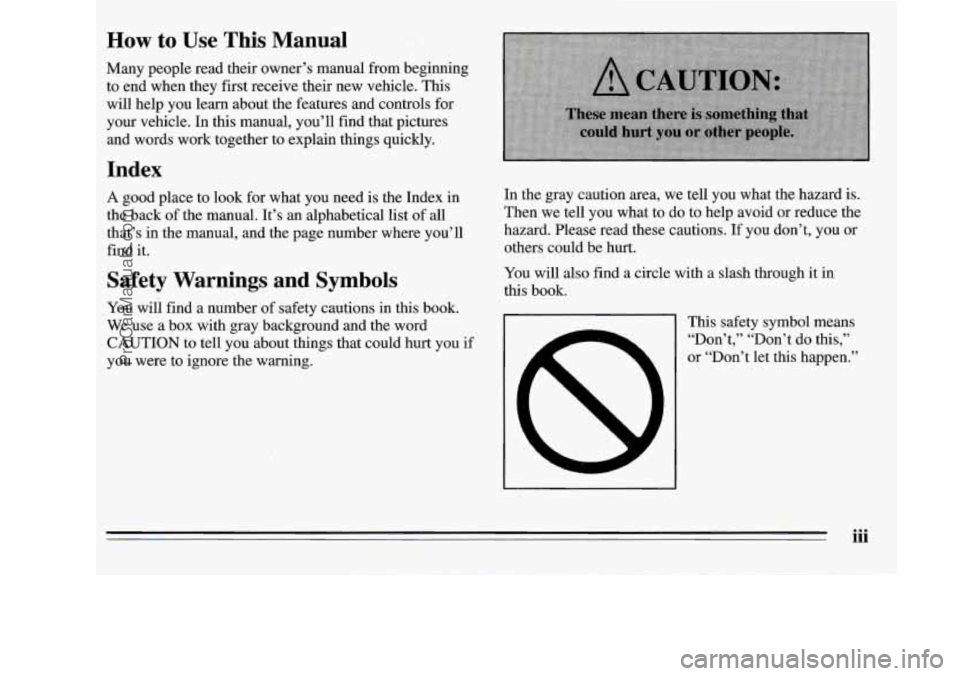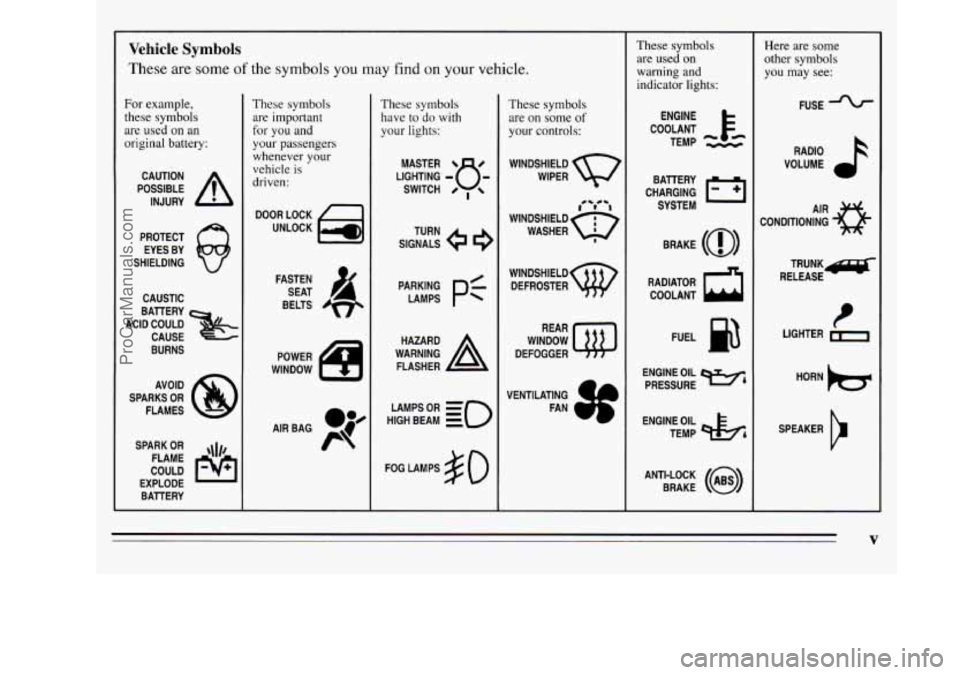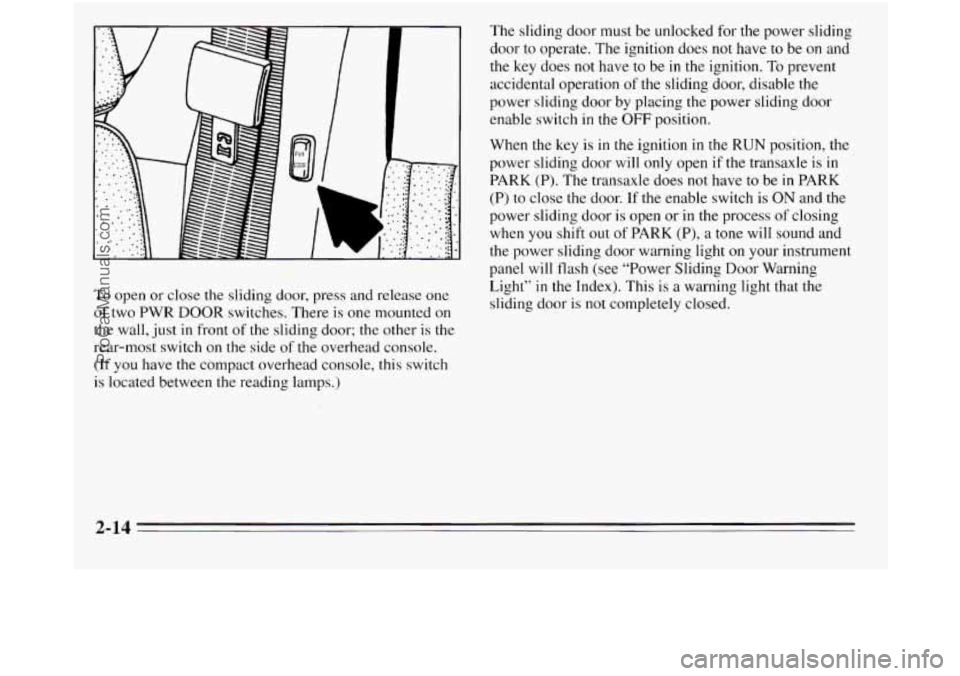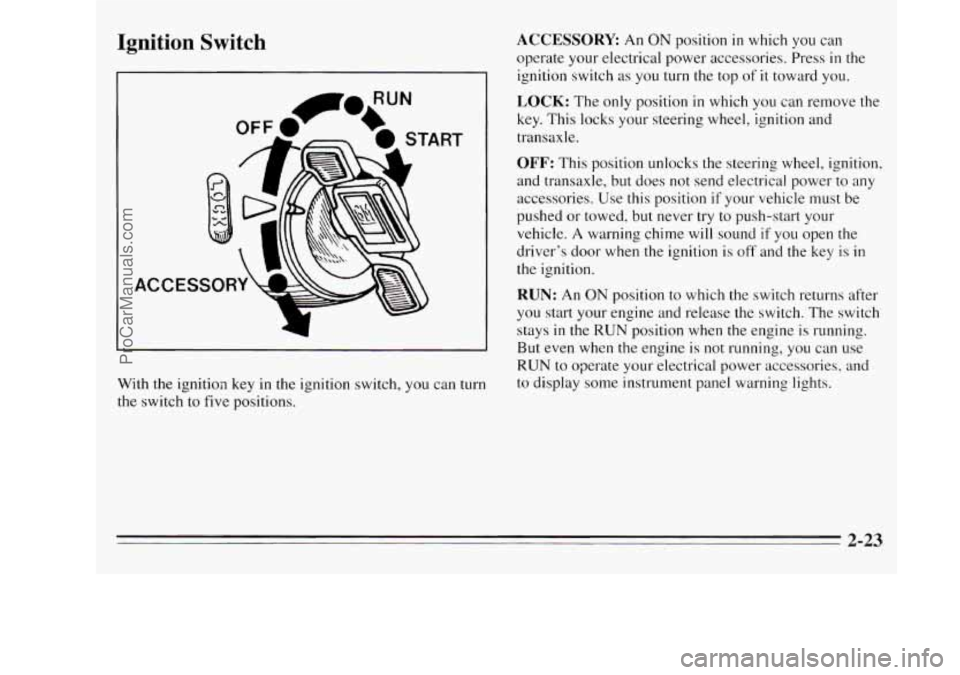Page 7 of 390

How to Use This Manual
Many people read their owner’s manual from beginning
to end when they first receive their new vehicle. This will help you learn about the features and controls for
your vehicle. In this manual, you’ll find that pictures and words work together to explain things quickly.
Index
A good place to look for what you need is the Index in
the back of the manual. It’s an alphabetical list of
all
that’s in the manual, and the page number where you’ll
find it.
Safety Warnings and Symbols
You will find a number of safety cautions in this book.
We use a box with gray background and the word
CAUTION to tell you about things that could hurt you if
you were to ignore the warning.
In the gray caution area, we tell you what the hazard is.
Then we tell you what to do to help avoid or reduce the
hazard. Please read these cautions.
If you don’t, you or
others could be hurt.
You will also find a circle with a slash through it in
this book.
1 This safetv symbol means d.,
“Don’t,” “Don’t do this,”
or “Don’t let this happen.”
iii
ProCarManuals.com
Page 8 of 390
Vehicle Damage Warnings
Also in this book you will find these notices:
NOTICE:
These mean there is something that
could
damage your vehicle.
In the notice area, we tell you about something that can
damage your vehicle. Many times, this damage would
not be covered by your warranty, and it could be costly.
But the notice will tell you what to
do to help avoid the
damage.
When you read other manuals,
you might see
CAUTION and
NOTICE warnings in different colors or
in different words.
You’ll also see warning labels on your vehicle. They use
yellow for cautions, blue for notices and the words
CAUTION or NOTICE.
iv
ProCarManuals.com
Page 9 of 390

L
Vehicle Symbols
These are some of the symbols you may find on your vehicle.
For example,
these symbols are used on an
original battery:
POSSIBLE A
CAUTION
INJURY
PROTECT EYES BY
SHIELDING
CAUSTIC
ACID COULD BAlTERY
CAUSE
BURNS
AVOID
SPARKS
OR
FLAMES
SPARK
OR ,111,
COULD FLAME
EXPLODE BAllERY
These symbols are important
for you and
your passengers whenever your
vehicle is
driven:
DOOR LOCK
UNLOCK
FASTEN SEAT
BELTS
POWER
WINDOW
These symbols have to do with
your lights:
SIGNALS e e3
TURN
WARNING
A
HAZARD
FLASHER
HIGH
LAMPSoR BEAM = zo
FOG LAMPS $0
These symbols
are on some
of
your controls:
WINDSHIELD
WIPER
WINDSHIELD DEFROSTER
WINDOW
DEFOGGER
VENTILATING FAN
These symbols are used on
warning and
indicator lights:
COOLANT F-
TEMP --
ENGINE
CHARGING BAllERY
SYSTEM
BRAKE
(a)
RADIATOR COOLANT
a
FUEL
ENGINE OIL
PRESSURE
w4
TEMP OIL pk;
ANTI-LOCK (a)
BRAKE
Here are some
other symbols
you may see:
FUSE
RADIO
VOLUME
CONDITIONING
43
TRUNX~
RELEASE
HORN
)tr
SPEAKER
b
V
ProCarManuals.com
Page 51 of 390
To make sure that the child is tall enough, compare the
child’s standing height to the top surface of the bucket
seat, which is about
29 inches (74 cm) from the floor. The
booster seat can be used by children over
40 pounds
(18 kg) or whose shoulders are above the shoulder belt
anchorages
of the 5-point child restraint harness. The
vehicle lap-shoulder belt is used instead
of the 5-point
harness system.
If a child’s shoulders are higher than the
shoulder belt anchorages while using the 5-point
harness, the spine could be injured in a collision.
WARNING! FAILURE TO FOLLOW THE
MANUFACTURER’S INSTRUCTIONS ON THE USE
OF THIS CHILD RESTRAINT
SYSTEM CAN
RESULT
IN YOUR CHILD STRIKING THE
VEHICLE’S INTERIOR DURING A SUDDEN STOP
1-41
ProCarManuals.com
Page 71 of 390
Here you can learn about the many standard and
optional features on your Oldsmobile, and information
on starting, shifting and braking. Also explained are the - -
instrument panel and the warning systems that tell you
everything is working properly -- and what to do if yo1
have a problem.
Keys
if
1
2-1
ProCarManuals.com
Page 84 of 390

To open or close the sliding door, press and release one
of two PWR DOOR switches. There is one mounted
on
the wall, just in front of the sliding door; the other is the
rear-most switch on
the side of the overhead console.
(If you have the compact overhead console, this switch
is located between the reading lamps.) The sliding door must be unlocked
for the power sliding
door to operate. The ignition does not have to be on and
the key does
not have to be in the ignition. To prevent
accidental operation
of the sliding door, disable the
power sliding door by placing
the power sliding door
enable switch in the
OFF position.
When the key is
in the ignition in the RUN position, the
power sliding door will only open if the transaxle is in
PARK
(P). The transaxle does not have to be in PARK
(P) to close the door. If the enable switch is ON and the
power sliding door
is open or in the process of closing
when you shift out of PARK
(P), a tone will sound and
the power sliding door warning light on your instrument
panel will flash (see “Power Sliding Door Warning
Light” in the Index). This is a warning light that the
sliding door is not completely closed.
2-14
ProCarManuals.com
Page 90 of 390
To close the liftgate, pull down on the strap, then firmly
shut the liftgate. Don’t drive with the liftgate open, even
slightly. See “Exhaust” in the Index.
A light on your instrument panel will warn you if the
liftgate is not completely closed (see “Liftgate Ajar
Warning Light” in the Index).
2-20
ProCarManuals.com
Page 93 of 390

Ignition Switch
ACCE
With the ignition key in the ignition switch, you can turn
the switch to five positions.
ACCESSORY An ON position in which you can
operate your electrical power accessories. Press
in the
ignition switch
as you turn the top of it toward you.
LOCK: The only position in which you can remove the
key. This locks your steering wheel, ignition and
transaxle.
OFF: This position unlocks the steering wheel, ignition,
and transaxle, but does not send electrical power to any
accessories. Use this position
if your vehicle must be
pushed or towed, but never try
to push-start your
vehicle. A warning chime will sound if
you open the
driver’s door when the ignition is off and the key is in
the ignition.
RUN: An ON position to which the switch returns after
you start your engine and release the switch. The switch
stays in
the RUN position when the engine is running.
But even when the engine is not running, you can use
RUN to operate your electrical power accessories, and
to display some instrument panel warning lights.
2-23
ProCarManuals.com